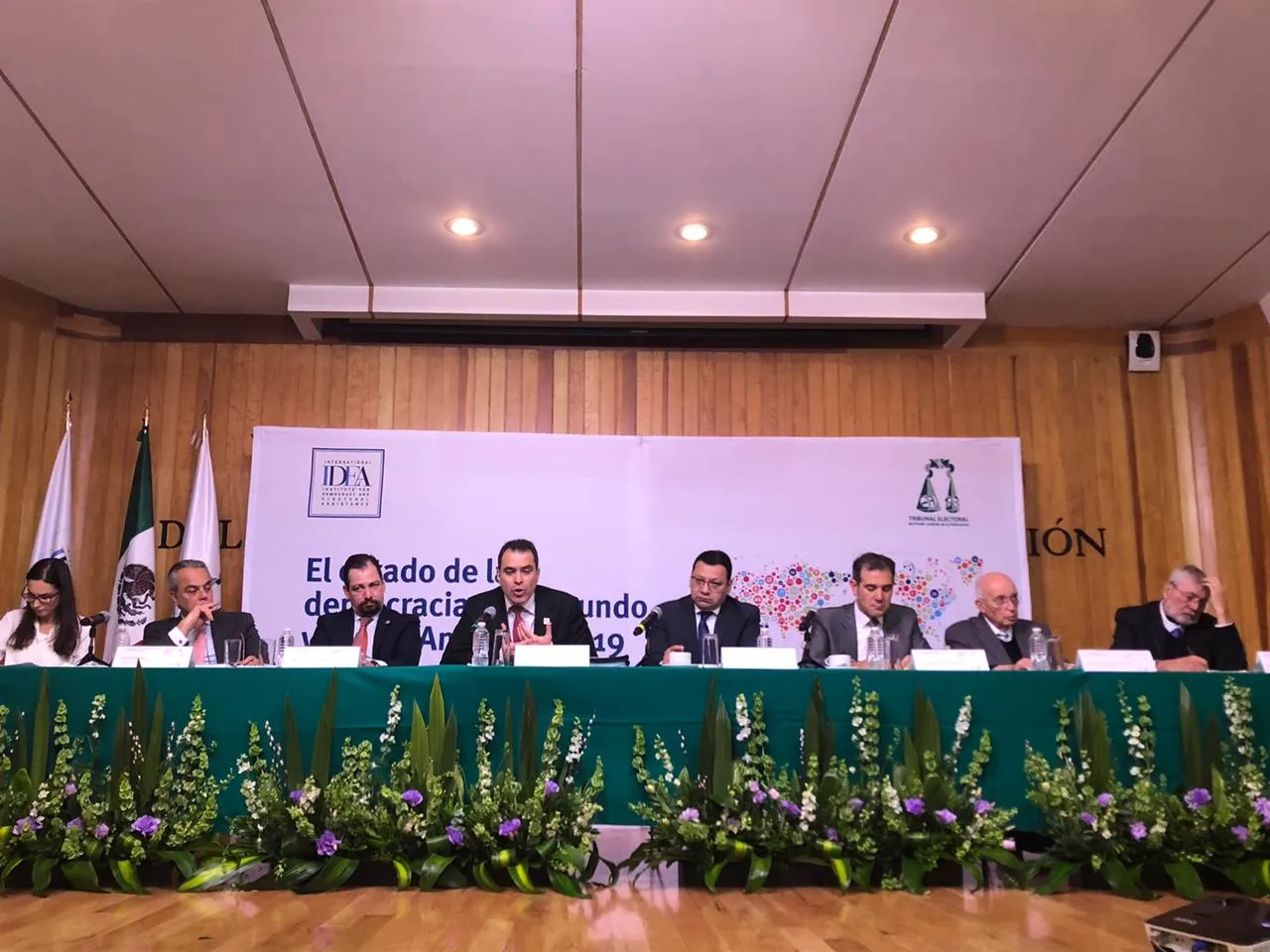Regional launch of “The state of democracy in the world and in the Americas 2019”

On 10 December 2019, Jurisdictional and international authorities along with experts in democracy, elections and electoral justice met at the headquarters of the High Chamber of the Electoral Tribunal of the Federal Judiciary of Mexico (TEPJF in Spanish) to present the findings of International IDEA’s report The State of Democracy in the World and in the Americas 2019.
Este artículo se encuentra disponible en español.
Among the authorities present were the Magistrate President of the TEPJF, Felipe A. Fuentes Barrera, the Justice José Luis Vargas Valdez also from the TEPJF and International IDEA’s Secretary General, Dr Kevin Casas Zamora. Also from International IDEA, Dr Daniel Zovatto, Regional Director for Latin America and the Caribbean and Annika Silva-Leander, Head of the Democracy Assessment and Political Analysis Unit, were present. Other relevant authorities that participated were, Dr Lorenzo Córdova Vianello, Councilor President of the National Electoral Institute (INE); Jorge Alcocer Villanueva, Chief of Staff in the Secretariat for Internal Affairs, and José Agustín Ortiz Pinchetti, head of the Specialized Public Prosecutor's Office in Electoral Crimes (FEDE).
During the inaugural panel, each of the panelist emphasized on the value of democracy in Latin America. The President Magistrate Felipe Fuentes Barrera stressed that democracy is the best political system where citizens are guaranteed to live under better conditions, with more freedom and equality. The Secretary General, Kevín Casas pointed out that democracy remains the only political promise compatible with human dignity. Similarly, Mr Jorge Alcocer stressed that the report is a key element for the improvement of the experience of democracy both in Mexico and around the world. And finally, the Councilor President, Lorenzo Córdova highlighted the conclusion of the report which points that the current democratic conquests must be defended, and that democracy needs to be safeguarded as much as possible.
The subsequent panels presented both, the results of the report regarding Latin America and a series of proposals for improvement to strengthen democracy in the region. For the panel entitled “The state of democracy in Latin America,” Annika Silva-Leander presented both the methodology and a detailed explanation of the main results of the report The Global State of Democracy 2019. In this same panel, the Justice Mónica Aralí Soto Fregoso, pointed out the importance of effectively and substantially guaranteeing gender political equality, women's political representation and parity in the exercise of political power. Moreover, Dr Daniel Zovatto highlighted the main results pertaining to Latin America. During his intervention he outlined ten positive conclusions and ten challenges that need urgent attention. Of the positive conclusions, he highlighted that the region is the third most democratic region in the world, that the regional electoral systems have strengthened and that the region has the highest levels of electoral participation. Regarding the challenges, he emphasized the fact that several countries suffer from democratic weakness and in specific cases, some suffer from democratic fragility. Likewise, attention was put on the high levels of dissatisfaction with democracy, socio-economic inequality, corruption and violence, as well as the crisis of representation of political parties; all as substantial elements that endanger democracy in the region. Also present at the panel were Mónica Xavier Yelpo, senator of the Republic of Uruguay; Noam Lupu, from Vanderbilt University; Gerardo Munck, from the University of Southern California and journalist Glenda Umaña, who served as moderator.
For the third panel entitled "Solutions to Deepen Democracy in Latin America", the Magistrate José Luis Vargas Valdez; the Vice President of the Board of Advisors of International IDEA, Sergio Bitar; Professor Jacqueline Peschard of the National Autonomous University of Mexico (UNAM); and Gina Kawas of the Central American Bank for Economic Integration, were present. The table was moderated by Mario González, CNN journalist and news presenter. During his intervention Sergio Bitar highlighted the need to create social dialogue institutions to address current pressing challenges such as climate change. For her part, Gina Kawas stressed the importance of guaranteeing the existence of inclusive representative mechanisms and public policies to achieve gender parity in the short term. And finally, Justice José Luis Vargas called for joining and increasing efforts in favor of democratic institutions so that democracy is an intergenerational phenomenon.
Both the opening ceremony and the panels on the results and proposals of the report are available in the following link.



